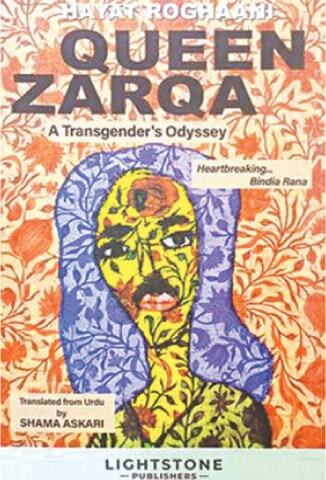By Dr Naazir Mahmood Hayat Roghaani
Queen Zarqa: A Transgender’s Odyssey
By Hayat Roghaani
Translated from Urdu by Shama Askari
Lightstone Publishers
ISBN: 978-9697162925
It is rare to find a translation from Urdu to English that is as engaging and fluid as this one. Shama Askari’s rendering of Hayat Roghaani’s novella captures the reader from the first page and doesn’t let go. Originally written in Pashto, the book was first translated into Urdu by Gohar Rehman, and that version served as the source for Shama’s English translation.
What stands out in this translation are three key qualities: accuracy, clarity and readability. From beginning to end, Shama Askari maintains a consistent approach, capturing both the literal meaning and emotional tone of the original text. Given the cultural intricacies of Khyber Pakhtunkhwa, translating such a narrative is no easy feat. Yet, Shama manages to navigate these challenges with impressive linguistic precision, producing a version that feels authentic and smooth.
Hayat Roghaani is a prominent intellectual and writer from Khyber Pakhtunkhwa. Known for his contributions to Pashto poetry and prose, he is also an active human rights advocate, particularly dedicated to the rights of transgender individuals. His commitment to social justice is evident in his work, and Queen Zarqa stands as a testament to his empathy and courage.
Few fiction writers in Pakistan have explored the lives of transgender individuals with such depth. One notable exception is Akhtar Baloch, whose book Teesri Jins [The Third Sex] offers insight into transgender communities across Sindh. Hayat Roghaani takes this further by crafting what is perhaps the first Pashto novella focused on transgender issues. The original Pashto title, Neenzak, literally means ‘a transgender person.’
The English translation of a Pashto novella about transgenders is engaging and fluid and captures the harsh realities they face — from familial rejection to societal scorn
The story emphasises that transgender individuals can and do play meaningful roles in society. Through the narrative, readers are confronted with the harsh realities this community faces — from familial rejection to societal scorn. The novella powerfully conveys how the transgender community is often harassed, mocked and denied even basic respect, both within individuals’ own families and by society at large.
Roghaani touches on nearly every facet of transgender life in Pakistan: initiation into the community, naming ceremonies, dance rituals, and the fragile means by which they survive. Given the scarcity of written literature about transgender individuals in Pakistan, this book breaks ground by discussing a subject still considered taboo in many circles. It contains numerous incidents that illustrate the persistent discrimination and abuse faced by the transgender community.
The novella also explores the psychological and social challenges transgender individuals face across the country — from Peshawar to Karachi. Its characters are drawn from real-life situations, giving the story authenticity. The protagonist, Zeerak Khan, is orphaned as an infant after a roof collapse. Raised by extended family, he soon becomes a target of ridicule due to his feminine behavior. Rejected and marginalised, he leaves his village and relocates to Karachi with an acquaintance. There, he is renamed Zarqa and begins performing dance and music to survive.
While this review avoids revealing too much of the plot, some key elements are worth highlighting. Despite finding a semblance of community in Karachi, Zarqa and others like her are still objectified and often subjected to sexual harassment or attempted assault. Most are forced into entertainment work simply to make ends meet, as they have few other viable opportunities. Even those who wish to pursue alternative careers find doors firmly closed.
This situation reflects the broader conservative and patriarchal mindset that dominates much of Pakistani society — a society where anyone who deviates from the norm is often subjected to systemic injustice. The novella argues for a more inclusive and pluralistic approach, where everyone, regardless of gender identity, is afforded dignity and opportunity.
Queen Zarqa invites readers to move beyond binary thinking and confront the regressive norms that marginalise the transgender community. Roghaani doesn’t just narrate a story; he challenges entrenched prejudices and advocates for change. At its heart, the book is about identity — the pain of existing between male and female categories and the struggle for recognition in a society unwilling to acknowledge anything in between. Zarqa yearns for belonging, something her family and hometown deny her.
The novella also weaves in the broader socio-political backdrop of Pakistan — from the influx of Afghan refugees to the ‘Islamisation’ policies of General Ziaul Haq, and the rising tide of terrorism. This turbulent context ultimately culminates in the tragic end of Zarqa, who dies in a bomb blast on the streets of Karachi.
The reviewer is a columnist and educator.
He can be reached at mnazir1964@yahoo.co.uk
X: @NaazirMahmood
Published in Dawn, Books & Authors, July 6th, 2025
